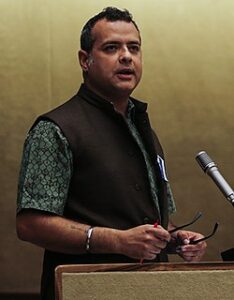Elon Musk Craves Return Of Fascism Across Europe
 01-13-2025 ~ The world’s richest person seeks a descent into deep political crisis so reactionary forces can prevail again—just as they did in the 1930s.
01-13-2025 ~ The world’s richest person seeks a descent into deep political crisis so reactionary forces can prevail again—just as they did in the 1930s.
Elon Musk spent over a quarter million dollars to back Trump and other MAGA Republican candidates in last year’s U.S. elections. He did so not simply because he has a lot to gain from Trump’s presidency, which he does, but also because of his own ideological proclivities.
Musk is a right-wing extremist and not content to limit his meddling to U.S. politics. In fact, he is clearly on a personal mission to advance the cause of the far right across the western world. Hence his foray into European politics.
Ahead of next month’s federal election in Germany, Musk took to his social platform X on December 20 to proclaim that “only the AfD can save Germany” while describing chancellor Olaf Scholz as an “incompetent fool,” urging him in turn to resign, and President Frank-Walter Steinmeier as an “anti-democratic tyrant.” He doubled down a few days later on his full-throated support for the far-right party, Alternative for Germany (AfD), in an op-ed for the prominent German newspaper Die Welt, calling it “the last spark of hope” for the country. He went on to say that AfD “can lead the country into a future where economic prosperity, cultural integrity and technological innovations are not just wishes, but reality.” Incidentally, Musk—like all good imperialist investors—feels that his business investment in Germany gives him the right to make incursions into the country’s political condition. Read more
Trump’s Imperialism Atop Western Warmongering

C.J. Polychroniou
01-10-2025 ~ The hypocrisy of the so-called “highly-developed” or “rule-of-law” democracies knows no bounds.
Conflicts across the world’s regions experienced a further surge in 2024, according to data provided by Armed Conflict Locations & Event Data (ACLED)—an independent, international non-profit organization that collects data on real time on locations, actors, fatalities, and types of all reported political violence and protest events around the world. While Ukraine and Gaza are considered the two major global hotspots of conflict, violence increased by 25 percent in 2024 compared to 2023 and conflict levels have experienced a two-fold increase over the past five years, according to ACLED. The intensity and human toll of armed conflicts are also on the rise as more civilians are exposed to violence and the number of actors involved in violence is proliferating.
What is also noteworthy about the data on violence collected by ACLED is that neither democracy nor more development appears to constrain violence. In fact, the data collected by ACLED shows that countries with elections in 2024 experienced much higher rates of violence than countries without elections. Read more
Guide To Preserving Sacred Land Near You

Jimmy Videle ~ Source: YouTube
01-09-2025 ~ Preserving biodiversity is among the most urgent issues of our time, and it needs to be addressed regionally to succeed.
Anthropogenic climate change and biodiversity loss are the most pressing issues for our planet. Carbon dioxide emissions in the atmosphere continue to rise due to the burning of fossil fuels and land use change, with the latter occurring primarily in the form of animal agriculture and growing crops to feed livestock. Biodiversity loss is greatly enhanced by these climate changes, causing catastrophic threats to nature. Because these unprecedented climate changes make modeling future scenarios relatively impossible, region-by-region data is the only reliable tool, so conservation efforts must begin regionally.
Biodiversity comes from the term “biological diversity.” Many biologists have followed the most simple and concise definition: “The totality of genes, species, and ecosystems in a region.” Biodiversity in one region can be very different from another, even within the same state, province, or country, and it is necessary to preserve and protect it all. Protecting Earth’s biodiversity is essential because it ensures the stability of ecosystems, which provide vital resources like clean air, water, and food. Biodiversity also supports resilience against environmental changes and diseases, securing a sustainable future for all life. Read more
The Banana Road From South America To China

Vijay Prashad
01-05-2025 ~ In November, Álvaro Noboa, the father of Ecuador’s president Daniel Noboa, had a heart attack. He was hastily taken to a clinic in Guayaquil, his hometown, and then after he was stabilized, flown to a hospital in New York. Álvaro Noboa unsuccessfully ran for president five times (1998, 2002, 2006, 2009, and 2013), but it was his son who prevailed in 2023 at the age of 35. What defines the Noboa family is not political office, but the wealth of the Noboa Corporation. Grupo Noboa was formed out of Bananera Noboa S.A. set up in 1947 by Luis Noboa Naranjo, the grandfather of the current president. Bananera Noboa expanded, thanks to Álvaro, into the Exportadora Bananera Noboa, which is the heart of the Group’s billion-dollar empire in Ecuador (population 18 million, a third of whom live below an abysmally low poverty line). The name of the expanded firm has two words in it that describe the hold of the Noboa family on the Ecuadorian economy and on its political life: the export (exportadora) of bananas (bananera).
Banana Trade
Countries other than Ecuador produce a very large share of the world’s banana product. India produces more than a quarter of bananas, while China produces a tenth. But these are not banana-exporting countries because they have enormous domestic markets for bananas. More than 90 percent of the world’s exported bananas come from Central and South America as well as the Philippines. Ecuador, which only produces a little over 5 percent of the world’s banana produce, exports 95 percent of its production, making up 36 percent of the world’s exported bananas (Costa Rica is next at 15 percent). Grupo Noboa is Ecuador’s largest banana firm, and therefore one of the most important companies in the export of bananas globally. The largest importers of bananas are the European Union (5.1 million tons), the United States (4.1 million tons), and China (1.8 million tons). Europe and the United States have established suppliers in Central and South America (Colombia, Costa Rica, Ecuador, and the Dominican Republic), and neither experience major supply shortages. Read more
Trump Has Stuffed His Cabinet With Oligarchs Poised To Govern For Their Profit

The Bosses of the Senate, a cartoon by Joseph Keppler. First published in Puck 1889.
01-05-2025 ~ The circle of billionaires in Trump’s cabinet embodies the reign of American oligarchy.
In the narrative of mainstream U.S. media, oligarchs — super-rich, politically connected individuals with influence over the state — exist only in post-communist countries and post-colonial societies in Latin America, Asia and Africa. Their power is seen as a foreign, un-American deviation from capitalism. In reality, however, the United States’ own oligarchs are thriving.
The U.S., despite the continued reverie expressed for democratic ideals, has shown to be a full-fledged plutocratic oligarchy — and for the next four years, it will be run directly by the oligarchs themselves. President-elect Donald Trump has assembled an administration of billionaires and warmongers whose combined wealth runs into hundreds of billions of dollars.
In a way, there is nothing surprising about this disturbing development. The rich in the U.S. have seen their wealth rise dramatically over the past 30 years, and the last four years have been particularly great for billionaires. Most people in the U.S. think that the economy works only for the rich and the powerful. Read more
How The World Hides Liability For Climate Deaths
 01-04-2025 ~ Unfair family planning regimes have stalled progress in the climate fight and prevent children from having a fair start in life.
01-04-2025 ~ Unfair family planning regimes have stalled progress in the climate fight and prevent children from having a fair start in life.
Nearly half the world’s children “live in countries where risks to their health and safety due to the effects of climate change are extremely high,” according to UNICEF. By 2050, almost all children globally will be “exposed to heat waves,” resulting in the rise of specific health issues, especially for smaller children, adds the agency.
Rich nations’ inability or unwillingness to curb their emissions has exacerbated the climate crisis, which, if left unchecked, may unfold apocalyptic scenarios. Those most responsible for the climate crisis spent decades funding denialism while robbing children and animals of the future they deserve. They exploited the world’s people and resources while hoarding wealth for themselves.
The outcome of the 2024 United Nations Climate Change Conference, or COP29, held in Baku, Azerbaijan, is a shining example of how rich countries are reluctant to take remedial steps to secure the children’s and the planet’s future. The COP29 was widely criticized for the rich world’s failure to adequately address developing nations’ critical climate-related financing needs.
“The latest NCQG [New Collective Quantified Goal on Climate Finance] decision at COP29 starkly highlights the unwillingness of developed and oil-rich nations to take responsibility for their historical and substantial emissions,” said Pegah Moulana, the secretary general of Youth and Environment Europe, the largest independent platform of environmental youth organizations in Europe. “By failing to provide concrete support to the most affected states and neglecting to establish a robust protocol to ensure these nations remain debt-free during implementation, the decision exacerbates climate injustice.”
According to a 2024 analysis by the International Institute for Environment and Development, the poorest countries and those most vulnerable to climate change spend “more than twice as much to service their debts as they receive to fight the climate crisis.” Read more


